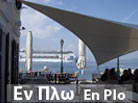Dionysios Solomos
|
|||
|
Early Life and Education He was born in 1798 as the illegitimate child of a wealthy count, Nikolaos Solomos, and his housekeeper, Angeliki Nikli, but his father married his mother a day before his death, making the young Dionysios legitimate and a co-heir of the estate with his half-brother. In 1808 he went to Italy, where he studied law, Latin and Italian literature in Venice, Cremona and Pavia. He was friends with the poet Ugo Foscolo (who was also born in Zakynthos). Solomos' first literary language was Italian. After 10 years he returned to Zakynthos with a solid background in literature. Solomos became famous as a poet during this time, while still a young man. His early poetry (sonnets and other short forms) was in Italian. His education in Greek was minimal, which kept him free of any scholarly influences, that might have led him to write in katharevousa, a "purist" language heavily influenced by ancient Greek. Instead he wrote in the language of the common people of his native island. The result was the first extensive body of literature written in the demotic language, the influence of which on subsequent writers was significant. Later Life and Death At the end of 1828 he left Zakynthos and settled in Kerkyra ("Corfu") in order to dedicate himself to poetry. Solomos died in February 1857 from apoplexy. His remains were transferred to Zakynthos in 1865. Literary Influences and Major Works |
|||

Philippos Hotel
Philippos hotel is situated in the centre of the friendly resort of Kassiopi on the North East coast of Corfu. The hotel is located in the middle of an olive grove, an quiet place ideal for families and couples. Go to Philippos Hotel page

En Plo
Set in a historic area of the old town with magnificent views to the Greek Mainland, the ΄΄ EN PLO΄΄ Café – Restaurant, offers you an excellent opportunity to get away from it all. Go to En Plo page

En Plo
Set in a historic area of the old town with magnificent views to the Greek Mainland, the ΄΄ EN PLO΄΄ Café – Restaurant, offers you an excellent opportunity to get away from it all. Go to En Plo page
ADVERTISE
|









 Corfu Weather live
Corfu Weather live








